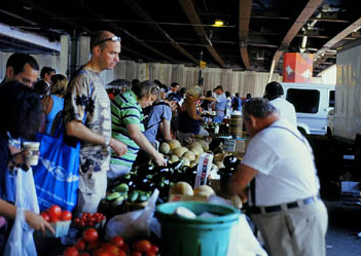Home » Course Layouts » Free Course Layout Udemy
This course uses experiential learning, discussion, service learning, and related texts to challenge students to look closely at the environment of Baltimore City's complex food systems. Students consider what it would take to improve these systems to assure access for all to nutritious, adequate, affordable food; to address diet-related disease; to create just and sustainable food labour conditions; increase the supply of and demand for healthy and sustainably produced foods, and to reduce food system environmental harms.
0
22
English
English [CC]
FREE
- Learn basic syntax that can apply to any language.
- Learn what is a programming language and the basic concepts for beginners.
- Understand what is Javascript in it's truest form.
- Know the basic syntax of Javascript.
- Know some hidden quirks in Javascript.
Description
Students "go backstage" with tour guides at a supermarket, an emergency food centre, an urban farm, a rural farm, and an aquaponics facility. Students will participate in service-learning projects, providing the opportunity to contribute to improving the city’s food system while gaining additional experiential insights. Students will also have the opportunity to conduct interviews with some of those who have been at the forefront of food system change in Baltimore. In-class sessions are structured primarily as discussion seminars. Guest speakers active in the city’s food system join many of the sessions to share their perspectives.
Throughout, students consider the relative impacts of access, demand, cost, stakeholder interests, administrative issues, history, and power, and consider the relative strengths of voluntary, governmental, legal and other strategies. Discussions and lectures consider the applicability of lessons gained from the study of Baltimore to other food systems.
Course Objectives
Upon successfully completing this course, students will be able to:- Analyze responses to challenges and opportunities within Baltimore's food system
- Discuss key factors that have shaped food systems in Baltimore and other urban locales
- Describe from first-hand experience the clientele, operations, key opportunities, and challenges in advancing positive change in Baltimore food and agriculture system sites
- Discuss innovative food system interventions being considered in Baltimore and elsewhere
- Describe how food systems and food environments relate to public health broadly and environmental public health more specifically
- Conduct and document qualitative interviews
- Comment on how the city’s history has contributed to the current food system
- Provide assistance targeted to a community organization’s needs, and reflect on the experience.
Course content
-
- History and community food security 03:00:00
-
- Supermarkets 03:00:00
- Corner Stores 03:10:00
- Issues of race, class, MD Food System Map 03:00:00
- School Food and Farm Policy 03:00:00
- Direct Marketing and Regional Food Systems 03:00:00
- Food System Workers Discussion 04:00:00
- Projects 2 weeks
N.A
- 5 stars0
- 4 stars0
- 3 stars0
- 2 stars0
- 1 stars0
No Reviews found for this course.
Instructor
John Hopkin University
0
0
169
6
Explore Free Courses
Access valuable knowledge without any cost.
{"title":"","show_title":"0","post_type":"course","taxonomy":"course-cat","term":"engineering-skills,health-and-safety","post_ids":"","course_style":"free","featured_style":"course6","masonry":"","grid_columns":"clear4 col-md-3","column_width":"268","gutter":"30","grid_number":"4","infinite":"","pagination":"","grid_excerpt_length":"20","grid_link":"1","grid_search":"0","course_type":"","css_class":"","container_css":"","custom_css":""}










